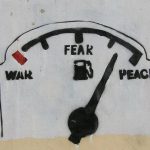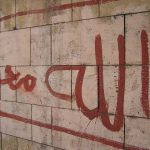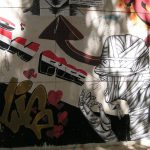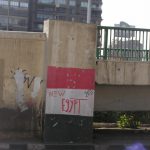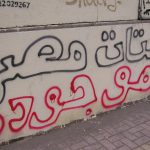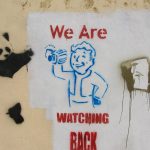The political situation here is tense due to the sporadic protests. At first it was disconcerting, then it shifted to inspiring, and now it’s just an apathetic fact.
At the dorms here we joke “Hey, its casual protest friday again”. We have the TV in the downstairs lobby set to show the live protest feed from Tahrir square. When there is a big one, we will sit around and marvel in shock at the thousands of people gathered, until they are forced to disperse and dart away from the police.
Being in a country immediately post-revolution is quite the experience. In America, we all live in neighborhoods that are relatively safe, and can either choose to participate in the political scene and have opinions, or instead stay within the suburbia bubble of Starbucks and reality TV.
In Egypt, the revolution was forced upon all of the people at once. Their sense of security was impaired as streets overwhelmed with ongoing and sporadic protests. I’ve talked to a lot of people here, and for many it was a sobering experience. Many of the class lines that are normally distinct have been blurred, and everyone was united against the cause of bringing down the government. When everyone is in the same square is shouting “Ash-shab yurid isqat an-nizam”(The people want the fall of the system) suddenly the tensions between Christians and Muslims, lower class and upper class, men and women, fade momentarily into the background.
The result is that people here have been inspired, and the manifestations are everywhere. The art covers the streets. And by covers, I mean that around every corner there is another mural with a political statement, or picture commemorating someone who gave their life in the revolution.
The underground music scene has sprung forth into the foreground, and the same YouTube and Facebook circles used to orchestrate the revolution are now utilized to spread music.
And while in America, where these garage bands would be isolated to a particular musical niche, the people of Egypt revere them, and invite them on news shows to sing their ballads about the beauty of Egypt, and how the people need to work together to create a new country.
I cannot explain to you the richness of expression that has taken over this country.
Instead I will try to show you.
The pictures are from around Zamalek and Tahrir, as part of a graffiti documentary by my friend Cassie Bath. These are some of many, many murals that I pass every day on the way to class. We are just trying to bear witness to this revolution in the most complete way possible.
The revolution has given people a voice that they didn’t have before. Women are able to speak up, and while their voices aren’t as loud as men’s, at least they now have a forum in which to participate. College students are intensely active, participating in protests, organizing them, and encouraging people to be politically active on campus.
Even though the revolution was over a year ago, the people here are still excited. At after all that happened, it’s really hard, even for me, to let it fade into the background. Beyond the artistic renaissance that is Cairo, the memories stick with you. Egyptians have renamed their towns and streets after important dates in revolutions, so streets have names like “26th of July”, and towns have names like “6th of October.”

